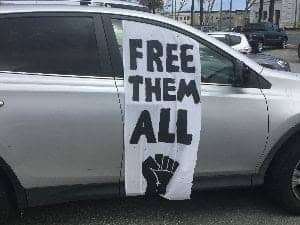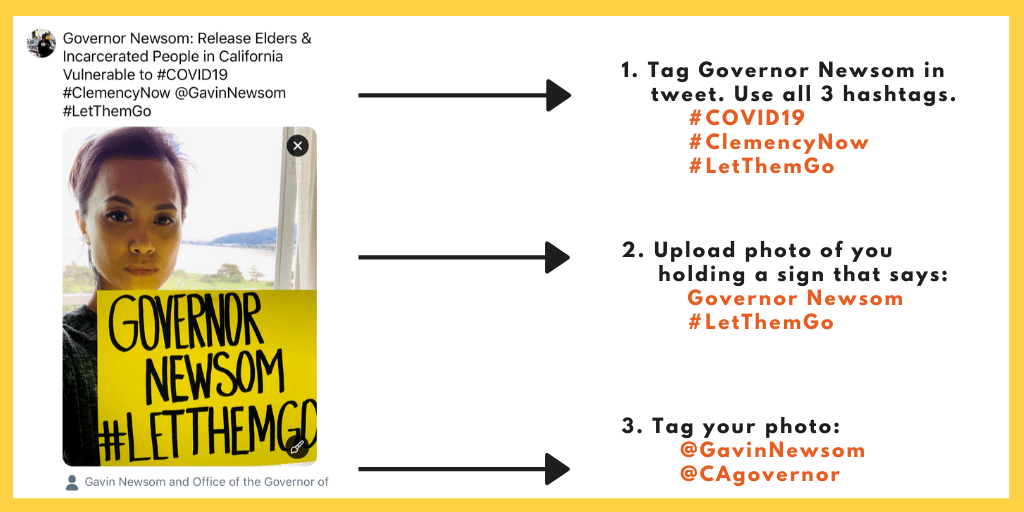
by Noelle Hanrahan, Prison Radio
The time to act has come. It is right now. It is tonight and tomorrow. We must demand the immediate release en masse of half of the 47,000 people inside Pennsylvania state prisons.
New circumstances require new ways of fighting back.
The myths and excuses that have motivated and propped up mass incarceration are falling. Just let folks go. Everyone who is elderly and at risk. Everyone who is parole eligible. Everyone with a release date in 2020 or 2021.
“The DOC (Department of Corrections) releases 20,000 people EVERY YEAR. Mass release is normal in the United States,” says attorney Bret Grote of the Abolitionist Law Center.
“We are saying that the process needs to speed up so it happens now, not over 12 months. We need tens of thousands out in Pennsylvania. COVID-19 doesn’t care about your racist politics, and it does not discriminate between staff and the incarcerated,” said Grote.
In Mumia’s home state of Pennsylvania, Gov. Wolf must use his “Reprieve Power” under the Pennsylvania Constitution to release people right now. This power was granted to the governor in the state Constitution. “Reprieve Power” is the temporary suspension of sentences and release of inmates; it is exactly for this type of public health emergency. It can be done.
“The current COVID-19 crisis illustrates precisely why reprieves – unlike pardons and commutations – are free from regulation: The governor needs a mechanism to act immediately to avoid disaster in prisons and jails, whether the disaster is putting a potentially innocent person to death or stemming a viral outbreak that could lead to many deaths,” notes Ben Notterman at NYU’s Center on the Administration of Criminal Law, quoted in the Appeal.
All of our lives depend on it, guards, prisoners and family alike.
We must aggressively decarcerate in order to avert the disaster of continued high infection rates amongst those who live and work in correctional facilities. It is a national imperative.
Join the Twitter storm. Join the organizing. Go to the Facebook pages of Amistad Law Project, Release Aging People in Prison (RAPP), Abolitionist Law Center, CADBI (Coalition to Abolish Death By Incarceration) and the Human Rights Campaign.
It is happening all over the country. Folks are waking up. New York City Correctional Health Services Chief Medical Officer Ross MacDonald says in a letter to district attorneys and judges, “I simply ask that in this time of crisis the focus remain on releasing as many vulnerable people as possible.”
If the past few tumultuous weeks have taught us anything, it’s that in order to endure these times and to deal with the swiftly evolving urgencies of the era, we must stay connected to our people on the inside and keep pushing for their freedom. It is imperative.
Standing in solidarity with prisoners, their families and with the communities who are disproportionately impacted by incarceration means calling for a wide scale release of prisoners for the sake of public health. Simply put, in an echo heard around the nation: “LET OUR PEOPLE GO!”
Here are some encouraging examples of what the power of the people can do!
Check out these organizing initiatives and positive actions towards decarceration.
- March 31, bowing to public pressure, California prisons are set to release 3,500 inmates over the course of the next 60 days, as the virus spreads throughout the institutions.
- March 26, Attorney General William Barr announced that in order to lessen the impact of the pandemic, he instructed federal prisons to free inmates over 60 who have not been convicted of violent or sexual crimes. This initiative impacts approximately 2,000 federal prisoners.
- March 31, in Pennsylvania the federal court ordered 13 ICE detainees released immediately, recognizing that ICE cannot keep elderly and medically vulnerable people safe.
- ACLU Pennsylvania has asked the state Supreme Court to intervene. Philadelphia DA Larry Krasner has stated “This historic health emergency demands swift, decisive action by all who have been empowered by the people to act on their behalf,” Krasner said. “No one with any amount of public power should get to sit on the sidelines during this crisis.”
These initiatives towards decarceration were always possible! False concern for “public safety” has been leveraged against the ideal of prison abolition for years, but COVID-19 exposes that for the sham it always was. What we’re seeing is that when the 1 percent realizes it’s in their best interests to quell the swelling prison population, then it suddenly becomes potentiality.

Mass incarceration was never in the best interests of the general public. Vast numbers of detained people around the nation – in detention camps, prisons and jail cells – are non-violent offenders, elderly, in poor health, and in far too many cases are sitting in jail while awaiting trial simply because they are unable to pay for bail, yet supposedly presumed innocent.
Right now, coronavirus is of paramount public safety concern and maintaining cages full of prisoners puts us in greater danger, not less. As of March 30, in NYC’s Rikers Island penitentiary, 167 inmates have tested positive for COVID-19, along with 137 staff members. And this is just the beginning.
We must aggressively decarcerate in order to avert the disaster of continued high infection rates amongst those who live and work in correctional facilities. It is a national imperative.
Join us. Raise your voice so the decree can be heard in congressional halls, attorneys’ offices and judges’ chambers around the nation: “From the redwood forests to the Gulfstream waters, let our people go!”
When We Fight, We Win! Noelle Noelle Hanrahan is a private investigator, director of Prison Radio and producer and co-writer of the feature length documentary “Mumia: Long Distance Revolutionary” (2013). She can be reached at info@prisonradio.org. |





